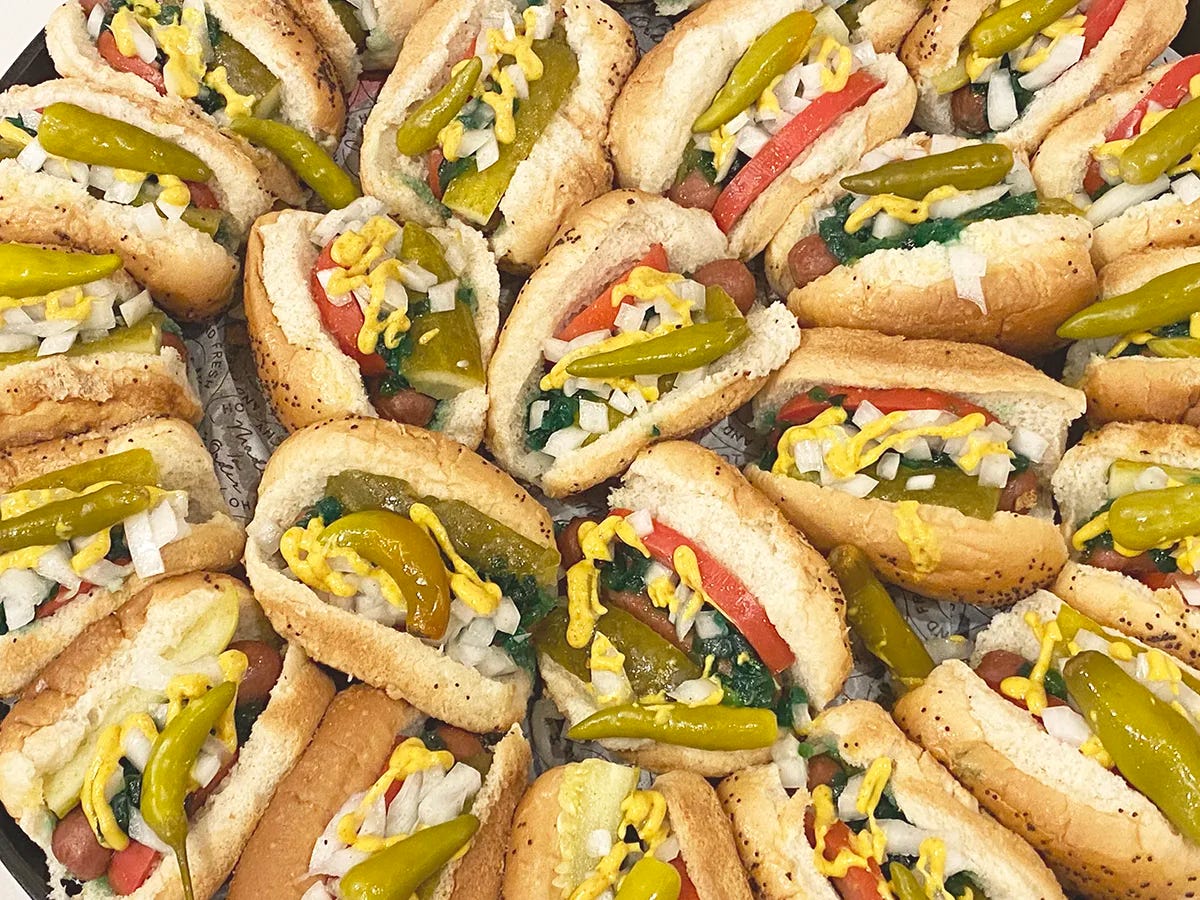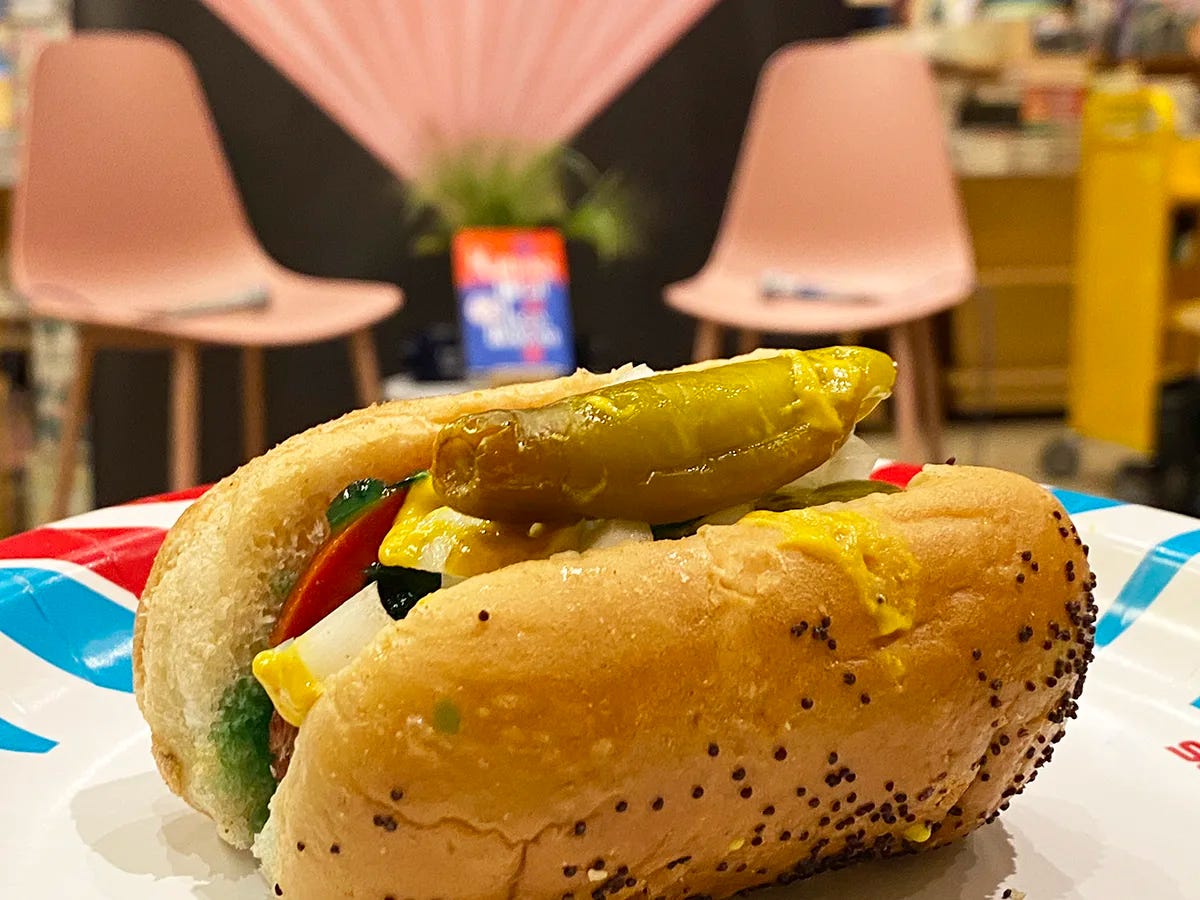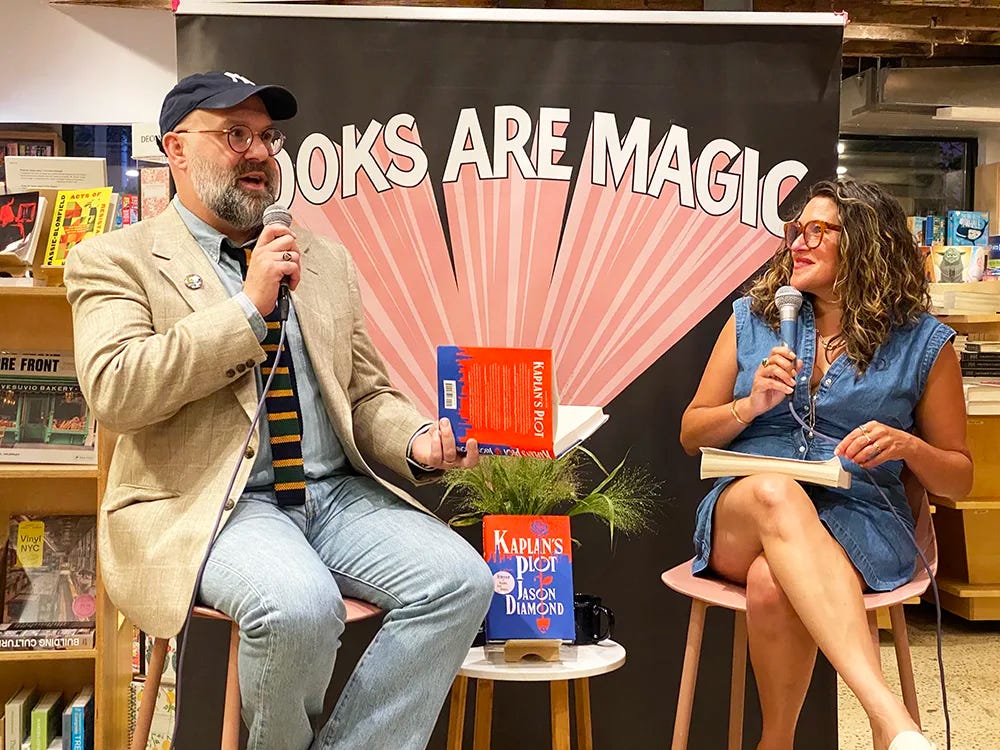Food Notes: 9/16
Chicago Hot Dogs, Kaplan's Plot, stinky cheese, cheap soy, expensive beef and more
I ate a mini Chicago hot dog.
Jason Diamond launched his debut novel, Kaplan’s Plot, at Books Are Magic in Brooklyn last night. (He’s also the author of The Sprawl, which I reviewed five years ago.) Like any good novel, Kaplan’s Plot features a lot of food talk, and since its set in his home city of Chicago, the only logical thing to do at a book launch was to serve the crowd Chicago-style hot dogs.
I had my first Chicago-style hot dog back in 2023, and I wrote about that experience at this newsletter’s sister-blog, All The Things I Eat.
For those of you more familiar with New York-style hot dogs, you might be confused by what’s happening here. New York dogs are typically topped with onions, either raw or cooked in a tomato-y sauce, and / or sauerkraut, and a dash of mustard and / or ketchup. Meanwhile, in Chicago, there’s simply a lot more stuff, and only children eat ketchup.
Key Elements of a Chicago-Style Hot Dog
Poppy seed bun
Neon-green relish
Mustard
Tomato
Pickle
Onions
Pickled Sport Pepper
The Chicago dog is sometimes known as having been “dragged through the garden,” because of all the vegetables. These toppings developed during the Great Depression as hot dog cart vendors tried to differentiate themselves, and create good value. By adding toppings from the nearby farm stands, they used cheap ingredients to upsell patrons on heartier meals.
It’s popular to credit Fluky’s, a pushcart founded by Abe Drexler, with “inventing” the Chicago dog. However, the reality is, many of the carts around the city were selling similar combinations, and they each were trying to upstage the other.
Street vendors were a big business in the city, especially among immigrants, and the hot dog reflected those ethnicities. It’s been said that each of the ingredients can be credited to ethnic groups in the city, from Eastern European Jews, Mexicans, Italians, and Greeks. More likely, each of these ingredients were a cheap way to dress up a hot dog.
Unfortunately, street vending was too popular, so the city of Chicago banned pushcarts and food trucks from selling anything except uncut produce and frozen desserts, aka ice cream. Chicago style dogs had to move indoors to food restaurants. In more recent years, as food trucks became popular again, the city often ignored the law until was eventually repealed.
Anyway, I arrived early—on time?—for the book event. I grabbed a seat, before chatting with some writers. Then the hot dogs were unveiled and I was able to grab a stunning picture of all of them arranged on the platter. Nobody wanted to disturb the perfect arrangement by being the first to take a dog, but also everyone was hungry. Finally, a elderly gentleman broke the seal, unleashing the hounds.
Just in case I don’t get around to writing about the actual event, here’s Jason Diamond talking with Xochitl Gonzalez, author of Olga Dies Dreaming.
The Latest
Where Have All the Food Contests Gone?
The Feast of San Gennaro is in full swing this week in lower Manhattan. One thing you won’t find though is competitive eating. The quarter-century cannoli eating contest and the more recent meatball, zeppole, and pizza eating were banned. I looked into why, and why anyone thought stuffing three dozen cannolis into their mouth was a good idea.
Opening a Coffee Shop? In This Economy?
Lots of people dream of running their own cafe. Maybe it’s their love of pastries, maybe its because they’ve just been laid off from a “safe” corporate job but the economy is tanking, or maybe they’re obsessed with latte art. Either way, opening a cafe isn’t what always what its cracked up to be. Julie Wolfson looks into how and why and maybe not of opening a cafe.
How to Pun a Pun?
Salt, Fat, Acid, Heat was on the bookshelf next to me at Books Are Magic last night. The eight-year-old cookbook was the crowning achievement of author Samin Nosrat—and good for her that its still on the shelf since many books simply don’t have the staying power. Turns out though that a smash success isn’t always a good thing. Bon Appétit checks in with Nosrat as she launches a new book, Good Things, and comes to terms with fame.
The Big Stink
Gastrob Obscura checks in with the last Limburger Cheese factory in America. Limburger smells a lot like feet, Johanna Mayer warns. The once popular German-style cheese is hard to get, and Mayer looks into why. Warning, this a podcast (but the transcript is there too).
Would You Like Soy Beans With That?
Turns out, when it comes to going woke or going broke, America chose going broke. American soybean farmers are out of luck as Chinese buyers have walked away from $3B in purchases over tariffs.
Soy Burgers For All!
While America might have a surplus soy beans sitting around, beef prices are sky high, and cattle ranchers are profiting.





